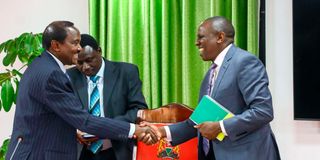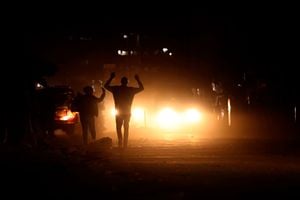Ruto-Raila talks: Kalonzo and Ichung’wa must deliver

Wiper Party leader Kalonzo Musyoka (left) and National Assembly Majority Leader Kimani Ichung’wah shake hands during the start of talks between the government and the Opposition at the Bomas of Kenya in Nairobi on August 9, 2023.
The late Mwai Kibaki is believed by most Kenyans to have been the most effective past president in the country’s history. There are several reasons for this sound conclusion. Among them were the visible results of his ten-year rule. Most people think Mr Kibaki succeeded in Kenya’s most difficult job because he was a technocrat.
They are dead wrong. The man from Othaya succeeded because he wasn’t given to sideshows and a lot of public talk. I want to give Azimio’s Kalonzo Musyoka and Kenya Kwanza’s Kimani Ichung’wa that pithy wisdom. Speak less and get down to work as the leaders of the dialogue team to resolve Kenya’s political crisis. To deliver, please shun posturing and too much talk.
The art – and science – of negotiations always entails a lot of bravado and braggadocio because no side wants to be viewed as weak-kneed. But now we are past juvenile insults and schoolyard bully tactics. We face an existential crisis in Kenya. We might even call it an inflection point. Patriots shouldn’t tempt fate, especially in a fragile post-colonial state, of which Kenya is a classic example. Who benefits if Kenya goes to hell in a handbasket? Those with resources will flee the country for new domiciles in Europe, North America, and the Middle East. The “hustlers” will contend with being internally displaced, or miserable refugees in Kenya’s near abroad in the larger East African region. Neither fate is welcome.
I was a refugee under Kanu and I know first-hand the penurious life of an asylee. It’s not a fate I’d wish on anyone. Even those with means who flee abroad to the West will not be at ease. Kenya’s political class – a decidedly fat-cat elite – will find it very difficult to fit in the West, even with their ill-gotten millions.
That’s because they are too old to culturally assimilate in the West. After your 20s, you are too old to become fully integrated in a new society. Visiting the West and settling there later in life are two totally different things. That’s why it’s best to fight like hell to keep the country of your nativity intact.
Concoction
There are those who believe Kenya as a state is irreversible. I am not one of them, and I believe I am better informed about the fragility of the African post-colonial state than most people. I have closely studied it and understand it very well.
The African post-colonial state is a sort of humpty dumpty. It’s very easy to collapse and virtually impossible to put back together. That’s because it’s an artificial concoction of Empire that never cohered into a nation. Kenya has never crossed the threshold of irreversibility. Those who think Kenya is an exceptional African state suffer from an uninterrogated jingoistic hubris. The Kenyan state is a dangerous paper tiger that can betray its citizens very quickly.
I remember a panel discussion on which I was a respondent at the Stanley Hotel on December 10, 2007 as we looked down the barrel of the gun of that year’s elections. That election pitted ODM’s Raila Odinga against Mwai Kibaki’s PNU. It was clear from all credible polls that Mr Odinga was going to administer a drubbing on Mr Kibaki. The man from Bondo was going to send Mr Kibaki to Othaya. I feared Mr Kibaki, the incumbent, and the hawks in his inner circle, were going either reject, or steal Mr Odinga’s victory and plunge the country into chaos. They did the latter and sent Kenya into genocidal spasms. That experience revealed Kenya’s humpty dumpty character.
I told folks at that Stanley Hotel panel discussion that Kenya could go the way of Somalia, Liberia, Ethiopia, Sudan, Rwanda – name your pick of any basket-case African post-colonial state. Dr Koki Muli, then the head of Institute for Education in Democracy, protested loudly. She shouted that Kenya wasn’t Somalia, and could never be.
I told her that Somalia wasn’t Somalia, the basket case, until it was. I remonstrated with her that there was nothing in Kenya’s DNA as a post-colonial that made it exceptional. I was proven right by the near-genocide violence that followed the stolen election. Today, we are in the grip of another cataclysm if Mr Musyoka and Mr Ichung’wa don’t seize the moment. But will they?
Kenya will be the loser if the two gentlemen don’t rise up to the challenge. Each needs to lead their troops on the committee with a resolute hand to fully ventilate and find solutions to the key issues that bedevil the country. The two are politicians and they will have a lot to lose if the talks collapse. Mr Musyoka is a credible future presidential candidate. He can burnish his credentials if he delivers a win for the country. Mr Ichung’wa has tons of potential for higher office. He shouldn’t blow this historic chance. As they say in Greek, they better not screw this up.
Makau Mutua is SUNY Distinguished Professor and Margaret W. Wong Professor at Buffalo Law School, The State University of New York. @makaumutua.





